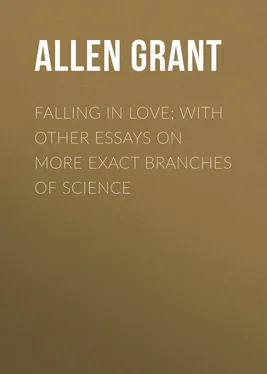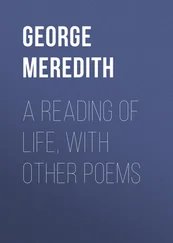Grant Allen - Falling in Love; With Other Essays on More Exact Branches of Science
Здесь есть возможность читать онлайн «Grant Allen - Falling in Love; With Other Essays on More Exact Branches of Science» — ознакомительный отрывок электронной книги совершенно бесплатно, а после прочтения отрывка купить полную версию. В некоторых случаях можно слушать аудио, скачать через торрент в формате fb2 и присутствует краткое содержание. Жанр: popular_business, foreign_edu, Прочая научная литература, на английском языке. Описание произведения, (предисловие) а так же отзывы посетителей доступны на портале библиотеки ЛибКат.
- Название:Falling in Love; With Other Essays on More Exact Branches of Science
- Автор:
- Жанр:
- Год:неизвестен
- ISBN:нет данных
- Рейтинг книги:4 / 5. Голосов: 1
-
Избранное:Добавить в избранное
- Отзывы:
-
Ваша оценка:
- 80
- 1
- 2
- 3
- 4
- 5
Falling in Love; With Other Essays on More Exact Branches of Science: краткое содержание, описание и аннотация
Предлагаем к чтению аннотацию, описание, краткое содержание или предисловие (зависит от того, что написал сам автор книги «Falling in Love; With Other Essays on More Exact Branches of Science»). Если вы не нашли необходимую информацию о книге — напишите в комментариях, мы постараемся отыскать её.
Falling in Love; With Other Essays on More Exact Branches of Science — читать онлайн ознакомительный отрывок
Ниже представлен текст книги, разбитый по страницам. Система сохранения места последней прочитанной страницы, позволяет с удобством читать онлайн бесплатно книгу «Falling in Love; With Other Essays on More Exact Branches of Science», без необходимости каждый раз заново искать на чём Вы остановились. Поставьте закладку, и сможете в любой момент перейти на страницу, на которой закончили чтение.
Интервал:
Закладка:
Grant Allen
Falling in Love; With Other Essays on More Exact Branches of Science
Some people complain that science is dry. That is, of course, a matter of taste. For my own part, I like my science and my champagne as dry as I can get them. But the public thinks otherwise. So I have ventured to sweeten accompanying samples as far as possible to suit the demand, and trust they will meet with the approbation of consumers.
Of the specimens here selected for exhibition, my title piece originally appeared in the Fortnightly Review : ' Honey Dew Конец ознакомительного фрагмента. Текст предоставлен ООО «ЛитРес». Прочитайте эту книгу целиком, купив полную легальную версию на ЛитРес. Безопасно оплатить книгу можно банковской картой Visa, MasterCard, Maestro, со счета мобильного телефона, с платежного терминала, в салоне МТС или Связной, через PayPal, WebMoney, Яндекс.Деньги, QIWI Кошелек, бонусными картами или другим удобным Вам способом.
' and ' The First Potter Конец ознакомительного фрагмента. Текст предоставлен ООО «ЛитРес». Прочитайте эту книгу целиком, купив полную легальную версию на ЛитРес. Безопасно оплатить книгу можно банковской картой Visa, MasterCard, Maestro, со счета мобильного телефона, с платежного терминала, в салоне МТС или Связной, через PayPal, WebMoney, Яндекс.Деньги, QIWI Кошелек, бонусными картами или другим удобным Вам способом.
' were contributions to Longman's Magazine : and all the rest found friendly shelter between the familiar yellow covers of the good old Cornhill . My thanks are due to the proprietors and editors of those various periodicals for kind permission to reproduce them here.
THE NOOK, DORKING:
September , 1889.
FALLING IN LOVE
An ancient and famous human institution is in pressing danger. Sir George Campbell has set his face against the time-honoured practice of Falling in Love. Parents innumerable, it is true, have set their faces against it already from immemorial antiquity; but then they only attacked the particular instance, without venturing to impugn the institution itself on general principles. An old Indian administrator, however, goes to work in all things on a different pattern. He would always like to regulate human life generally as a department of the India Office; and so Sir George Campbell would fain have husbands and wives selected for one another (perhaps on Dr. Johnson's principle, by the Lord Chancellor) with a view to the future development of the race, in the process which he not very felicitously or elegantly describes as 'man-breeding.' 'Probably,' he says, as reported in Nature , 'we have enough physiological knowledge to effect a vast improvement in the pairing of individuals of the same or allied races if we could only apply that knowledge to make fitting marriages, instead of giving way to foolish ideas about love and the tastes of young people, whom we can hardly trust to choose their own bonnets, much less to choose in a graver matter in which they are most likely to be influenced by frivolous prejudices.' He wants us, in other words, to discard the deep-seated inner physiological promptings of inherited instinct, and to substitute for them some calm and dispassionate but artificial selection of a fitting partner as the father or mother of future generations.
Now this is of course a serious subject, and it ought to be treated seriously and reverently. But, it seems to me, Sir George Campbell's conclusion is exactly the opposite one from the conclusion now being forced upon men of science by a study of the biological and psychological elements in this very complex problem of heredity. So far from considering love as a 'foolish idea,' opposed to the best interests of the race, I believe most competent physiologists and psychologists, especially those of the modern evolutionary school, would regard it rather as an essentially beneficent and conservative instinct developed and maintained in us by natural causes, for the very purpose of insuring just those precise advantages and improvements which Sir George Campbell thinks he could himself effect by a conscious and deliberate process of selection. More than that, I believe, for my own part (and I feel sure most evolutionists would cordially agree with me), that this beneficent inherited instinct of Falling in Love effects the object it has in view far more admirably, subtly, and satisfactorily, on the average of instances, than any clumsy human selective substitute could possibly effect it.
In short, my doctrine is simply the old-fashioned and confiding belief that marriages are made in heaven: with the further corollary that heaven manages them, one time with another, a great deal better than Sir George Campbell.
Let us first look how Falling in Love affects the standard of human efficiency; and then let us consider what would be the probable result of any definite conscious attempt to substitute for it some more deliberate external agency.
Falling in Love, as modern biology teaches us to believe, is nothing more than the latest, highest, and most involved exemplification, in the human race, of that almost universal selective process which Mr. Darwin has enabled us to recognise throughout the whole long series of the animal kingdom. The butterfly that circles and eddies in his aërial dance around his observant mate is endeavouring to charm her by the delicacy of his colouring, and to overcome her coyness by the display of his skill. The peacock that struts about in imperial pride under the eyes of his attentive hens, is really contributing to the future beauty and strength of his race by collecting to himself a harem through whom he hands down to posterity the valuable qualities which have gained the admiration of his mates in his own person. Mr. Wallace has shown that to be beautiful is to be efficient; and sexual selection is thus, as it were, a mere lateral form of natural selection—a survival of the fittest in the guise of mutual attractiveness and mutual adaptability, producing on the average a maximum of the best properties of the race in the resulting offspring. I need not dwell here upon this aspect of the case, because it is one with which, since the publication of the 'Descent of Man,' all the world has been sufficiently familiar.
In our own species, the selective process is marked by all the features common to selection throughout the whole animal kingdom; but it is also, as might be expected, far more specialised, far more individualised, far more cognisant of personal traits and minor peculiarities. It is furthermore exerted to a far greater extent upon mental and moral as well as physical peculiarities in the individual.
We cannot fall in love with everybody alike. Some of us fall in love with one person, some with another. This instinctive and deep-seated differential feeling we may regard as the outcome of complementary features, mental, moral, or physical, in the two persons concerned; and experience shows us that, in nine cases out of ten, it is a reciprocal affection, that is to say, in other words, an affection roused in unison by varying qualities in the respective individuals.
Of its eminently conservative and even upward tendency very little doubt can be reasonably entertained. We
Читать дальшеИнтервал:
Закладка:
Похожие книги на «Falling in Love; With Other Essays on More Exact Branches of Science»
Представляем Вашему вниманию похожие книги на «Falling in Love; With Other Essays on More Exact Branches of Science» списком для выбора. Мы отобрали схожую по названию и смыслу литературу в надежде предоставить читателям больше вариантов отыскать новые, интересные, ещё непрочитанные произведения.
Обсуждение, отзывы о книге «Falling in Love; With Other Essays on More Exact Branches of Science» и просто собственные мнения читателей. Оставьте ваши комментарии, напишите, что Вы думаете о произведении, его смысле или главных героях. Укажите что конкретно понравилось, а что нет, и почему Вы так считаете.












